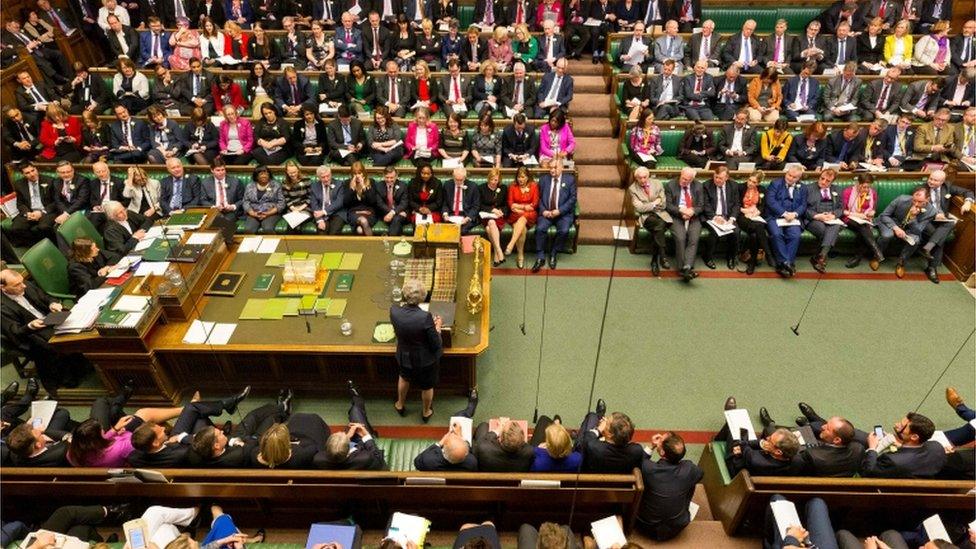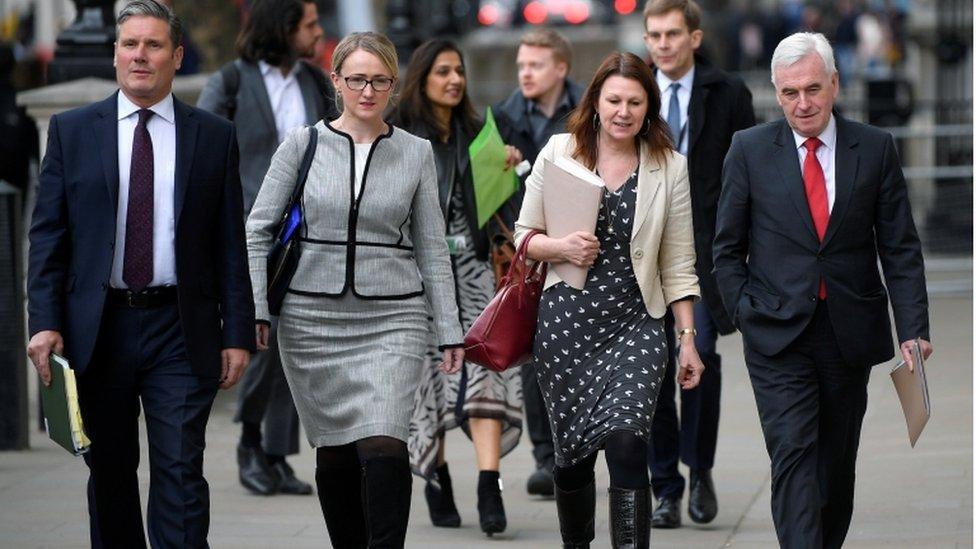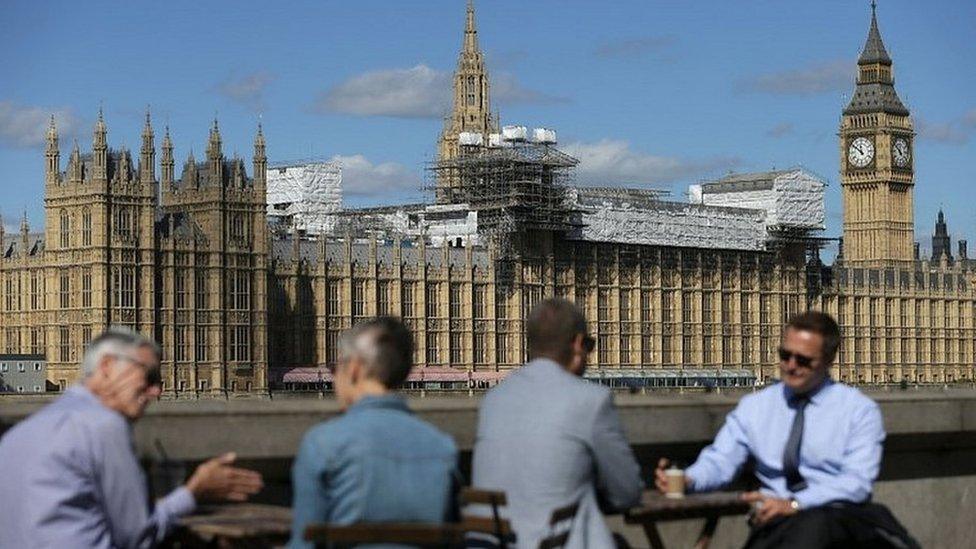Week ahead in Parliament
- Published

It's another week of waiting for Godot, or at any rate Brexit, with a thin diet of humdrum legislation before both the Commons and the Lords.
There is some talk that the long-awaited Withdrawal Agreement Bill might be launched into the Commons, perhaps on Thursday.
But that would seem to require some deal between the government and Labour to ensure a decent prospect of a majority.
This, if it happens, would certainly be a major event - and the bill would have to contain a get-out clause which would allow it to be considered as fulfilling the "meaningful vote" requirement under Section 13 of the EU Withdrawal Act.
However given the increasing disunity on the Conservative and Labour benches, even a deal between the government and opposition front benches would not provide a cast-iron guarantee of a majority for the bill.

Were the government to lean toward Labour's demand for a customs union with the EU, it would lose many Conservative backbenchers, and maybe quite a few ministers, as well; and many Labour MPs would find it very hard to back a compromise that did not include a "confirmatory referendum".
Both leaderships would need a very carefully calibrated compromise to hold most of their parties together, and it may prove to be a Snark that is impossible to hunt down.
This may be another week where the backstage manoeuvring is more interesting than the formal parliamentary business - but here's my rundown of the agenda, as it stands at the moment:
Monday 13 May
MPs begin their week (14:30 BST) with work and pensions questions, and the ensuing agenda leaves plenty of scope for urgent questions and ministerial statements.
The government seems to be seeking to ensure that at least one new bill has a second reading in the Commons every week - and this week's offering is the Non-Domestic Rating (Preparation for Digital Services) Bill, which enables HM Revenue and Customs to begin to design and build a new digital service for business rates.

MPs will debate protecting hedgerows where birds nest
In Westminster Hall MPs debate e-petition 244233: "Make 'netting' hedgerows to prevent birds from nesting a criminal offence."
The petitioners complain that developers are circumventing laws protecting birds by 'netting' hedgerows to prevent nesting, and that in turn allows the uprooting of hedgerows, which damages biodiversity and particularly for birds, whose numbers are in sharp decline.
The petition has attracted more than 350,000 signatures.
On the committee corridor a couple of very big long-term policy issues are under scrutiny: the Housing, Communities and Local Government committee (16:00) looks at local government finance and the 2019 Spending Review.
The inquiry comes in the wake of the National Audit Office (NAO) warning that it is increasingly hard for authorities to find further savings and balance their books, resulting in a decline in non-social care services, such as rubbish collection.
The spending watchdog warns there is a real prospect that another local authority will follow Northamptonshire County Council in effectively declaring itself bankrupt.
Sir Amyas Morse, who is head of the National Audit Office as well as the Comptroller and Auditor General, gives evidence at 17:00 BST.
Then the Joint Committee on the National Security Strategy (16.15) looks at the National Security Capability Review and Modernising Defence Programme with the former Chief of the Defence Staff, Lord Houghton of Richmond.
Likely topics for discussion include: the future of the armed forces; changing threats to UK national security; the return of 'great power politics'; and the effectiveness of the National Security Capability Review and Modernising Defence Programme in addressing these issues.
In the Lords (14.30) peers will debate the second reading of the Census (Return Particulars and Removal of Penalties) Bill - a three-clause measure that provides for questions on sexual orientation and gender identity to be included in censuses in England, Wales and Northern Ireland but makes answering those questions voluntary.
After that, peers will rattle through statutory instruments on animal health, plant health, seeds and seed potatoes, animal health, alien species in aquaculture and invasive non-native Species, and then Northern Ireland regulations on trade in animals and related products, plant health, animal health, seed potatoes and food, then rail safety and railways.
Tuesday 14 May
The Commons kicks off (11.30) with Foreign Office questions, which may see a debut for new FCO Minister Andrew Murrison.
The day's Ten Minute Rule Bill is on Hares Preservation - former Environment minister George Eustice will argue that the protections given to hares during their breeding season under the 1892 Hares Preservation Act are no longer effective, nor enforced.
"Orphaned, dependent leverets (young hares) perish when their mother is killed and there are pressures on the hare population, and England and Wales are among the few remaining European countries that do not have a modern close season on shooting hares during their breeding season which is a terrible oversight," Mr Eustice says.

George Eustice will introduce a bill aimed at protecting hares during their breeding season
His bill aims to update the law by banning the killing of hares during the breeding season. A similar law is already in place in Scotland.
The main debates are on two Labour motions - the first on prisons and probation looks especially well-timed, with increasing talk that the government is to "reset" its "Transforming Rehabilitation" programme to reform the probation service.
The debate could also see the debut of a new Prisons Minister, Robert Buckland, who steps into the role vacated by the newly promoted Rory Stewart.
Will he be challenged to match his predecessor's promise to resign, if the figures for violence in prisons do not improve?
The second debate is a Labour staple - on health and local public health service cuts.
In Westminster Hall Labour MP Matt Western leads a debate on One Public Estate (9.30).
This is the government initiative to maximise the value of public land owned by local councils and different government departments in the same area - an initiative he regards as quite successful, but in need of more discussion.
Other subjects to be debated include: the fee structure for immigration applications (11:00); the UK's shared prosperity fund (14.30); and the regulation of the medical aesthetics industry (16:00).
This debate will be led by Conservative Alberto Costa, who has pursued a campaign for better regulation of non-surgical cosmetic procedures like lip filling.
On the committee corridor the Justice Committee has a session on the HM Inspectorate of Prisons annual report, with Dame Glenys Stacey, HM Chief Inspector of Probation (10:00) which could provide an appetiser for the Opposition Day debate in the main chamber.
In the Lords (14:30) the usual half hour of questions to ministers is followed by the second reading of the Courts and Tribunals (Online Procedures) Bill which will create a committee to provide rules of court for online proceedings in civil and family courts and tribunals, to ensure that online services are designed for the everyday user.
This looks like an offcut from the 2017 Prisons and Courts Bill, which had to be abandoned because of Theresa May's snap election.
Finally, there is a short debate on improving the educational experience and attainment of adopted children, including those adopted from abroad.
Wednesday 15 May
MPs open (11.30) with half an hour of Wales questions, before the High Noon of Prime Minister's Question Time.
Then MPs will consider a statutory instrument on the Higher Education and Research Act 2017 - which seems to be a tidying-up measure.
And the main event is a general debate on serious violence.
In Westminster Hall the subjects for debate include: the minimum age for marriage and civil partnership (9.30); Rape trials and CPS's treatment of victims (11:00) ; access to NHS services for British Sign Language users (14.30) and trophy hunting (16.30).
My committee corridor pick is the Business, Energy and Industrial Strategy evidence session with Business Minister Andrew Stephenson, on automation and the future of work (10:00).
With predictions that automation may replace 1.5 million jobs, the hearing will examine how the government plans to manage the impact on workers, and capitalise on the research and commercial opportunities offered by automation.
And keep an eye on the Digital, Culture, Media and Sport session on immersive and addictive technologies (2.30 pm) with witnesses from Google, YouTube and Instagram.
In the Lords (15:00) peers debate three select committee reports: on movement of people in the cultural sector; UK foreign policy in a shifting world order and Brexit: plant and animal biosecurity.
Thursday 16 May
The Commons opens with Brexit Questions (9.30) followed by the weekly Business Statement from the Leader of the House - which may signal the long-awaited debate on the Withdrawal Agreement Bill.
The main debates are on the definition of Islamophobia and ton the International day against homophobia, biphobia and transphobia.
In the Lords (15:00) questions to ministers include the Lib Dem Lord Greaves on eradicating Japanese knotweed - and the main debates are on subjects raised by backbench peers.
First the former Labour Leader Baroness Royall of Blaisdon leads a discussion on the mental health of children and young adults in the UK.
As the principal of Somerville College, she'll talk about the exponential rise in mental health as an issue at universities (including suicides), and the need for better processes across the board to understand and tackle the pressures on young people including exams, debt, and the pressures of social media.
And she is expected to argue that the government does not understand that early investment can prevent some of the problems from arising later on.
Then the Lib Dem, Baroness Grender leads a debate on equality of opportunity and beneficial quality of life for young people.
She will suggest that the political focus on Brexit means the real issues for young people are often left behind, and that ways need to be found to respond to their concerns such as climate change, body confidence, period poverty and affordable housing.
There's also a second reading for the Rivers Authorities and Land Drainage Bill - a private members bill from the Commons to establish new bodies to coordinate flood risk management.
Neither House is due to sit on Friday 17th May.
- Published7 May 2019
- Published1 February 2018

- Published30 December 2020

